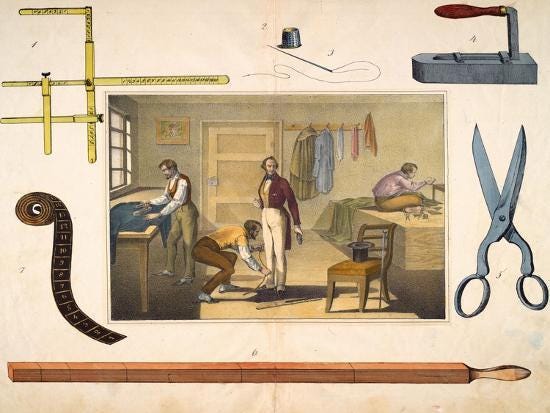A young man with a knack for thread studied hard and became a tailor. He was successful, fairly quickly as these things go, adorning elegant people in immaculate textile constructions. But he was unhappy with the gleaming veneered smiles, the smug social grease, the expense, the disposability of whims. He made beautiful things, and they fit his clients, but never sat right for him: so at last he left, and took in mending and took up gardening.
His cottage and its garden were not far from a small town on the water, with fishers and sailors coming and going each day like the tides. In addition to darning socks and sweaters, letting out and taking in hems, he learned to tie nets, splice ropes, and patch sails to hold the wind again. He grew plants, and grew older, and saw the things he made and mended get mended over again and handed down, around, and along.
One autumn day, a boatman he had mended for several times stopped by the cottage. He complimented the garden, with its profusion of asters, and shared a pot of tea with the tailor, talking of nothing much: the wind off the water, the best kind of soups to consider as the weather grew colder, a new shipment of wool to arrive from the west. As he placed his empty cup on the garden table, the boatman’s hand stretched away from the cuff of his sweater, and revealed a nasty cut just above his wrist. Its edges were ragged, fraying toward the bone, the stuff inside knobbled and threatening to escape.
The tailor caught his hand, swiftly but gently, and clucked his tongue. The boatman made a rueful face, but did not pull away.
‘Here’, said the tailor, ‘let me mend this for you’.
The boatman made a polite and noncommittal sound, but did not pull his hand away.
‘It is no trouble, really’, said the tailor. ‘Just a moment’. He vanished into the cottage briefly and returned with a small sewing kit. He set it on the table between them, pulling his chair closer. For the boatman’s hand there was a small, comfortable pillow, like a trivet. The tailor looked carefully at the hole, the exposed muscle fiber and silken fascia, the sea-worn texture of the exterior. He selected a fine linen thread, light and strong, and set to work.
Sometimes the tailor would ask his clients how their item came to need mending, when it seemed they had a story to tell. Other times, words would only tear the hurt further, not mend it. He wasn’t sure now whether, or what, to ask. The boatman’s items had never before needed mending for shame or neglect, only simple mischance, but perhaps this was different. He focused on the work, and the silence between them filled with the soft sound of thread, and the humming of bees readying for the long winter. The thread grew into a ladder, and then a lattice, woven far enough back into the whole and healthy arm that it would not pull free or twist or bind. Over and under, over and under, a neatly darned grid began to fill the hole.
The boatman watched the tailor working with interest. He had done mending of his own, especially before the tailor came to town, but he was more comfortable with larger things: ropes, oars, the water. The thin needle, the long and certain fingers, captivated him. An ache he had ignored began to ease.
Before long the work was done, the thread secured and the end tucked safe away inside. The darning was subtly visible, like a pale birthmark. The boatman’s hand lingered on the pillow, and the tailor’s hand lingered at the surface of his skin even as the rest of the kit was packed away. ‘No trouble at all’, he said. ‘Next time, come sooner, and we can do a neater job’.
The boatman laughed, as the work was already so much finer than any he could have imagined, but he agreed. They parted hands, and parted ways.
But next time, he came when the edges of the tear in his upper arm were still clean. He offered a not-quite-story about a stray hook, a misunderstanding, into which the tailor did not pry. His hands were gentle as he feather-stitched the edges closed and steamed the seam flat. If the boatman blushed, it was surely only from the cloud of warm heat on the cool day.
And so it continued, until one day the boatman came to visit when there was nothing to be mended at all, at least not with needle and thread. He complimented the garden, and shared a pot of tea, and in the comfortable silence offered his hand to the tailor, not to mend, but to hold.
They held one another for many years, in the garden and the little cottage and the bed cocooned with wools and linens. The tailor grew bald as he grew older, the fleece of his youth wearing smooth, lint trailing away down his shoulders and back to settle warmly, fuzzily in the creases of his belly, soft under the boatman’s wind-chapped hands. The tailor was well-worn but kept himself in good repair during the boatman’s absences. The boatman always promised to be careful, but often came home damaged, sometimes more, sometimes less.
After one such return, when the tailor had needed to shape layers of hot wet wool to rebuild coverage over bone, a more grievous hurt than his love had brought to him before, he held the boatman and ran his stiffening fingers through the threads of his beard. ‘Beloved’, he said, ‘how does this keep happening? A sailing life is rough, but yours seems roughest of all’. He paused. ‘I know that it is not your quarry’, for the boatman did not hunt, ‘nor a cruel captain or shipmate’, for the boatman worked alone, ‘so tell me, is it simply the sea? Is the water itself unkind to you? Or the wind?’ The tailor himself had no stomach for the water, and knew its ways only from stories. ‘I love you, and I will always mend you, but I wish I could keep you safer’.
The boatman sighed. The tailor had never tried to stitch him to the land, to bind them together so tightly–simply cared for him in his way. This was not a net, not a trap, but neither could he swim away. ‘It is not the sea’, he said. ‘The waters love me as best they can. And you are right that it is not a quarry, nor the sails, nor a captain, but perhaps you could say it is a shipmate’.
The tailor startled, indignant. ‘If someone is hurting you–’
The boatman kissed his brow gently. ‘No, love’.
‘I don’t understand’.
‘Sometimes what is needed is not what is wanted. Sometimes the going is hard and the travelers fearful. Some hurts can’t be mended, only witnessed’.
The tailor did not understand, entirely, but that last, he knew.
‘I go where I need to go, with those who need to be there, and I make the voyage as kind as I can. Sometimes I am more successful than other times’.
The tailor still did not understand, not yet, but part of him was beginning to, and it would take root and grow, in its time. He searched the boatman’s face, solemn and honest and old. ‘Just, oh, love’, he blinked for a long moment, ‘promise me, come home again? Don’t leave me with the old widows, walking the shore, looking for boats that never come in. Don’t–don’t go without me. In the end’.
‘Of course’, said the boatman. Not a net, but an anchor. ‘We are separate threads, but we twine together’. He kissed his lover tenderly, making the unspoken half of the promise. We will go together.
Someday, when there is no one left to ferry, and nothing left to mend.
Someday they will.
Toby MacNutt is a queer, nonbinary trans, disabled artist and author living in rural Vermont, USA. Their work has been published by or is forthcoming from magazines including Strange Horizons, The Future Fire, and Kaleidotrope. They are the guest editor of Infinite Branches from Interstellar Flight Press and their collection If Not Skin was published by Aqueduct in 2018. Find out more at www.tobymacnutt.com.







Toby, this is beautiful. So gentle and packed with images that in other hands could have turned harsh. It is subtly rhythmic, giving a sense of the sea, and the parallel motion of sewing, the in and out, tide and thread. In fact, so many echoes of this motion, with the coming and going of the boatman too. I really enjoyed it.
Oh my gosh - this is fast becoming one of my favourites. I agree with Kathie-Louise about the rhythmic nature of the tale. You've nailed the simplicity - there's so much there, but told so simply and honestly. And I really can't go by a tale about tailors and sewing. The revelation at the end made me a little teary, I confess. I love this tale - thank you!